Communist China may refer to:
- People's Republic of China (PRC), the modern state known as "China"
- Chinese Communist Party (CCP)
- Communist-controlled China (1927–1949)
- Chinese Soviet Republic (CSR)
- History of the People's Republic of China
Communist China may refer to:
Red China may refer to:

Rosamond Soong Ch'ing-ling was a Chinese political figure. As the third wife of Sun Yat-sen, then Premier of the Kuomintang and President of the Republic of China, she was often referred to as Madame Sun Yat-sen. She was a member of the Soong family and, together with her siblings, played a prominent role in China's politics prior to and after 1949.

A communist state, also known as a Marxist–Leninist state, is a one-party state that is administered and governed by a communist party guided by Marxism–Leninism. Marxism–Leninism was the state ideology of the Soviet Union, the Comintern after Bolshevisation and the communist states within the Comecon, the Eastern Bloc, and the Warsaw Pact. Marxism–Leninism currently still remains the ideology of a few parties around the world. After its peak when many communist states were established, the Revolutions of 1989 brought down most of the communist states, however, it is still the official ideology of the ruling parties of China, Cuba, Laos, and Vietnam. During most of the 20th century, before the Revolutions of 1989, around one-third of the world's population lived under communist states.
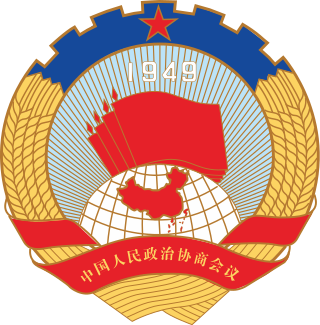
The Chinese People's Political Consultative Conference, also known as the People's PCC or simply the PCC (政协), is a political advisory body in the People's Republic of China and a central part of the Chinese Communist Party (CCP)'s united front system. Its members advise and put proposals for political and social issues to government bodies. However, the CPPCC is a body without real legislative power. While consultation does take place, it is supervised and directed by the CCP.
A Soviet republic, a republic ruled by soviets, may refer to one of the following:
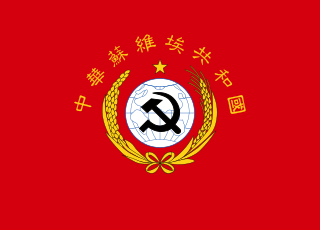
The Chinese Soviet Republic (CSR) was an East Asian proto-state in China, proclaimed on 7 November 1931 by Chinese communist leaders Mao Zedong and Zhu De in the early stages of the Chinese Civil War. The discontiguous territories of the CSR included 18 provinces and 4 counties under the communists' control. The CSR's government was located in its largest component territory, the Jiangxi–Fujian Soviet. Due to the importance of the Jiangxi–Fujian Soviet in the CSR's early history, the names Jiangxi Soviet and Kiangsi Soviet are sometimes used to refer to the CSR as a whole. Other component territories of the CSR included the Northeastern Jiangxi, Hunan-Jiangxi, Hunan-Hubei-Jiangxi, Hunan-Western Hubei, Hunan-Hubei-Sichuan-Guizhou, Shaanxi-Gansu, Szechuan-Shensi, Hubei-Henan-Anhui and Haifeng-Lufeng Soviets.

Paramount leader is an informal term for the most important political figure in the People's Republic of China (PRC). The paramount leader typically controls the Chinese Communist Party (CCP) and the People's Liberation Army (PLA), often holding the titles of CCP General Secretary and Chairman of the Central Military Commission (CMC). The head of state (president) or head of government (premier) are not necessarily paramount leader—under China's party-state system, CCP roles are politically more important than state titles.
The 1975 Constitution of the People's Republic of China was promulgated by the 4th National People's Congress. The offices of President and Vice-President were officially scrapped under the Constitution.
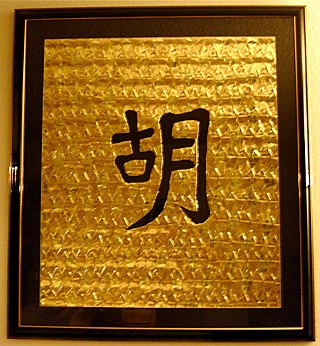
Hu is a Chinese surname. In 2006, it was the 15th most common surname in China. In 2013, it was the 13th most common in China, with 13.7 million Chinese sharing this surname. In 2019, Hu was the fifteenth most common surname in Mainland China.
Office of the President can refer to:

The free area of the Republic of China, also known as the "Taiwan Area of the Republic of China", "Tai-Min Area " or simply the "Taiwan Area", is a term used by the government of the Republic of China (ROC) to refer to the territories under its actual control.
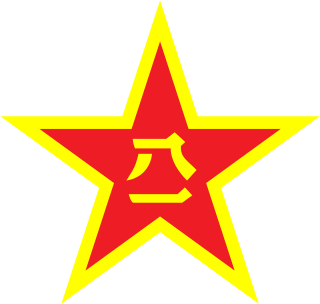
Armed forces of the People's Republic of China may refer to its three constituents:

Xu Qiliang is an air force general in the People's Liberation Army Air Force (PLAAF) of the People's Republic of China. He currently serves as a Vice Chairman of the Central Military Commission of the People's Republic of China. Until 2022, he served as a Vice Chairman of the Central Military Commission of the Chinese Communist Party. He served as a member of the 18th and the 19th Politburo of the Chinese Communist Party. He was promoted from Commander of the PLAAF from 2007 to 2012.

The National Flag of the People's Republic of China, also known as the Five-star Red Flag, is a Chinese red field with five golden stars charged at the canton. The design features one large star, with four smaller stars in an arc set off towards the fly. It has been the national flag of China since the foundation of the People's Republic of China on 1 October 1949.

Mao is the romanization of several Chinese family names, including common names 毛 (Máo), 茅 (Máo) and some rare names 茆 (Máo), 卯 (Mǎo), 貌 (Mào) etc.
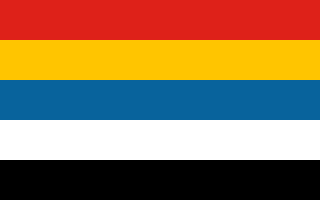
The Republic of China (ROC), between 1912 and 1949, was a sovereign state recognised as the official designation of China when it was based on Mainland China, prior to the relocation of its central government to Taiwan as a result of the Chinese Civil War. At a population of 541 million in 1949, it was the world's most populous country. Covering 11.4 million square kilometres, it consisted of 35 provinces, 1 special administrative region, 2 regions, 12 special municipalities, 14 leagues, and 4 special banners. The People's Republic of China (PRC), which rules mainland China today, considers ROC as a country that ceased to exist since 1949; thus, the history of ROC before 1949 is often referred to as Republican Era of China. The ROC, now based in Taiwan, today considers itself a continuation of the country, thus referring to the period of its mainland governance as the Mainland Period of the Republic of China in Taiwan.
The Republic of China is a state in East Asia, commonly known as Taiwan.

The National People's Congress (NPC) is the national legislature and constitutionally the supreme state authority of the People's Republic of China.

The president of the People's Republic of China, commonly called the president of China, is the head of state and the second-highest political office of the People's Republic of China. The presidency is a ceremonial office and not the role with the most power in China's political system. However, the post has been held by the general secretary of the Chinese Communist Party and chairman of the Central Military Commission since 1993, who is China's de facto leader.